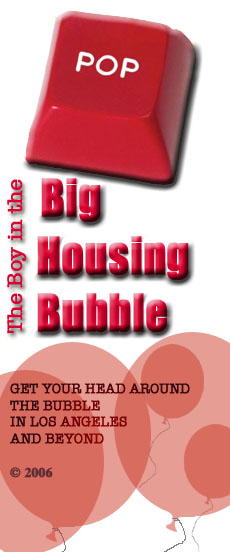Homes as cash machines

Dale Kasler, a reporter with the Sacramento Bee kicks off a three-part series today about the effects of the housing boom.
The first installment looks at how much wealth and how many jobs are at stake.
Here's an excerpt:
During baseball season, Bill Arnold sometimes watches his beloved Dodgers from a private luxury box: the backyard of his Rocklin home.Read the entire story at this link.
Covered patio, 32-inch television, beer tap, grill and swimming pool - all paid for by borrowing $100,000 against his ever-increasing home equity.
"We continue to be amazed about the value of our house," Arnold says.
It seems everyone in Arnold's Coppervale Ridge subdivision has a stake in the great American real estate boom. It's made them wealthier. It's created jobs. It provided security when big employers downsized.
But that dependence, some say, is a problem in the making.
The economy has been relying on real estate to an extent rarely seen, coasting on an intoxicating wave of rising prices and nonstop construction.
Now the boom is fading. Price increases are slowing in places like Sacramento and San Diego, and the number of unsold homes is growing.
It's unclear if real estate is a high-risk "bubble" that's begun to pop or a healthy market that's softening. Either way, the impact on the economy could be substantial. The danger lurks nationwide but casts an especially long shadow in California, where home prices are appreciating at nearly twice the U.S. average.
"When you scratch the surface about this recovery we're in right now, it doesn't look very pretty," said Chris Thornberg, who tracks the California economy for the UCLA Anderson Forecast. "We're in an economy that's being driven by this real estate bubble. ... I'm not saying it's going to collapse around our ears, but we definitely have this issue."
True, many experts say the housing market should stay reasonably strong and, should it falter, the economy is healthy enough to compensate. The national economy is expanding at a 3.3 percent annual rate, although Hurricane Katrina will slow growth. The state rate is 5.1 percent.
But job creation has been inconsistent and sluggish until the past few months. Key industries like high tech are still hiring cautiously. Even a modest real estate downturn could deprive the economy of a potent fuel source.
"We've been relying on the housing activity for our economic growth," said economist Scott Anderson at Wells Fargo & Co. in Minneapolis.
Although a big stumble probably isn't imminent, "we are quite vulnerable, especially in the labor market sense," he said. "If we lose that economic driver, it's going to have a significant effect on our labor market. The housing market does have the potential to derail this economic expansion."
The boom has reached far and wide in California, raising economic hopes even in the long-depressed farm towns of the Central Valley.
It's also helped keep Sacramento going. The influx of Bay Area transplants looking for cheaper homes has offset job cutbacks in high tech and state government. In an apt symbol of changing times, one of Sacramento's signature employers, rocket-engine manufacturer Aerojet, now pins its hopes mostly on building houses on its land holdings.
The region's real estate sector - agents, mortgage lenders and construction workers - accounted for 46 percent of the 24,000 jobs created in greater Sacramento during the past two years. This from a sector that represents just 10 percent of the job market. Construction alone has generated about 60 percent of greater Sacramento's new jobs this year.
Statewide, the real estate sector created 40 percent of all new jobs last year. The year before, real estate created 40,000 jobs while the rest of the economy lost 105,000 jobs.
Nationally, the real estate sector generated 465,000 new jobs from 2001 to 2004, according to consulting firm Economy.com. The rest of the economy lost 821,000 jobs.
Beyond hurting the job market, the real estate slowdown is likely to curb the massive wealth effect spawned by rising prices.
If you bought a house five years ago in California, you've doubled your money - and padded your disposable income. Home equity loans pumped $150 billion into the U.S. economy each of the last two years, Anderson said.
"Homeowners have used their homes as a cash machine," said Economy.com's Mark Zandi. Otherwise, "the recession of '01 would have been much deeper and (more) severe. The subsequent recovery would have been much weaker."
— The Boy in the Big Housing Bubble




<< Home